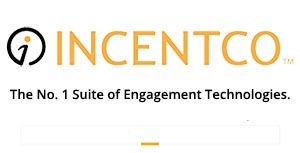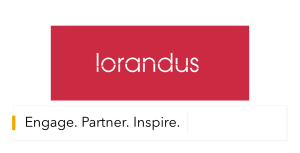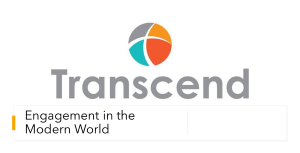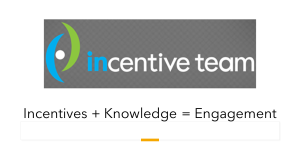Why Chester Elton, ‘Apostle of Appreciation,’ Now Focuses on Engagement
Few people have done more to advance the recognition field than Chester Elton, whose public speaking, research and outreach activities, along with his numerous books, including The Carrot Principle, The Orange Revolution, All In and What Motivates Me, have earned him the sobriquet “The Apostle of Appreciation.” He also has a short interview program on WCBS NewsRadio 880 in New York each Thursday at 9:30 am, ironically in conjunction with the station’s Wall Street opening bell report.

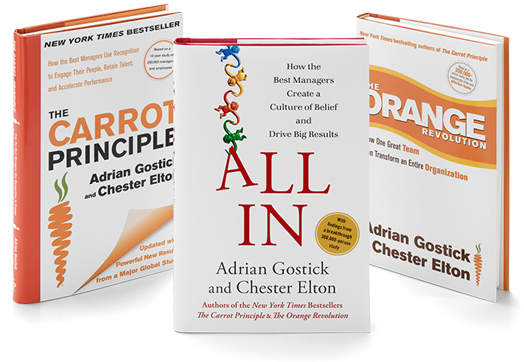 So why is Elton now focusing on engagement? In a word, research. The company has conducted and/or drawn upon extensive research by Towers Watson and others in conjunction with its books and development of methodologies for clients. What the research has revealed, Elton says, is that “Recognition is a key driver of engagement, but it’s not the only driver. Culture Works is an engagement company. Our slogan is: Engagement Solved. We are not a recognition company. We are a training and consulting company to drive employee engagement.”
So why is Elton now focusing on engagement? In a word, research. The company has conducted and/or drawn upon extensive research by Towers Watson and others in conjunction with its books and development of methodologies for clients. What the research has revealed, Elton says, is that “Recognition is a key driver of engagement, but it’s not the only driver. Culture Works is an engagement company. Our slogan is: Engagement Solved. We are not a recognition company. We are a training and consulting company to drive employee engagement.”
Study and Tool to Identify Key Motivation Drivers
To understand motivational drivers, the company developed a survey tool that has been administered to over 7,000 people in the U.S., Canada, Europe, Australia, Central and South America and Asia, producing, says Elton, enough data to provide a significant sampling. The key findings are outlined in the company’s white paper, Employee Engagement Solved. They include:
1. Engagement is not a one-size-fits-all proposition:
- Only 31.5% of working adults are motivated by Purpose at work
- Only 30.3% are motivated by Autonomy
- Only 22.5% are motivated by Teamwork
2. Millennials are motivated differently than others; the biggest motivators are:
- Impact 64%
- Learning 62%
- Family 51%
- Creativity 40%
- Challenge 38%
3. The survey found that the least motivating factors for Millennials are:
- Autonomy 20%
- Ownership 17%
- Money 9%
4. Employees who are focused on others have higher levels of engagement, to wit:
- “Developing Others” appeared as a top motivator three times more often with the happiest people.
- “Excelling” appeared as a top motivator more than twice as often with the happiest people.
- Teamwork, Challenge, Pressure and Problem Solving appeared as top motivators almost twice as often with the happiest people.
The study also found that while some motivational factors can change with age – older people generally enjoy mentoring more and get less satisfaction from recognition – most of the key motivators stay the same across all age groups, including impact, learning and family (the top motivators) and purpose, excelling and pressure (which are lower down the motivational scale).
Elton: Engagement Is a Formal Field
“We are absolutely part of a formal field,” he emphatically states, citing the creation of the Conference Board’s Engagement Institute and the many leading companies that are participating as proof. “What we at The Culture Works have tried to do is start with the data – what the numbers tell you,” he explains. “Then we put the data into a transferable model to give people a road map to follow.”
The world has changed, says Elton: “What we used to do doesn’t work anymore. In the old school of recognition, we treat everyone the same way. The more we have studied this, the more we see that the best leaders know their people; when they engage people, it’s a one-on-one exercise. When someone hits their five-year anniversary and a company sends them a link to a catalog, the real message is ‘We don’t know you at all. Hopefully there is something in the 500 things in the catalog that will make you happy.’ When you know someone, you don’t give them a catalog.”
Engaging people a lot more work and requires skills many executives and managers lack, he said. “It’s about the relationship. When someone does something important for the organization, the question to ask is: ‘What can we do that is special for you and your family?’ If I understand my motivators as a leader, I will lead better. If I understand the motivators of my team, I will be even a better leader. All of the research we are doing begs the question: Are we rewarding people in a way that’s meaningful to them? Will we be able to reward people differently based on who they are? This is where it gets interesting.”
Elton adds: “The best performing cultures have the right people in the right places with the right motivation. Unfortunately, people aren’t always passionate about what they are good at. When you can align personality and strengths – that drives the ultimate engagement.”
Fundamentally, Elton sees two key differentiators in business: great leaders and culture with clear values that everyone can understand. While The Culture Works focuses on employee engagement, Elton agrees that engagement is an enterprise-wide issue, and that once the culture is clearly identified, it can be translated to connect both customers and employees.
Will the Engagement Field Catch On?
Elton isn’t ready to predict just how fast the engagement field will grow or how big it will get. “As you know,” he says, “employee engagement is at an all-time low. A recent Towers Watson survey of executives around the world found that 90% of senior leaders recognized the importance of engagement, but only 24% believe their employees are engaged. What senior management lacks is a roadmap.”
He believes that over time the overwhelming research connecting engagement and performance, and the success of companies such as Southwest Airlines, Zappos, WestJet in Canada and many others will eventually get the attention of leaders. “The biggest driver is the economic benefits. We also need to make this process replicable and affordable so even small companies can figure it out.” That, says Elton, is one of the key missions of The Culture Works.
He says he’s hopeful that the growth of engagement will accelerate, but adds: “It’s so easy to get caught up in the minutia in business and short-term stuff. This is for the most part still a ‘nice to have’ instead of mission critical for most organizations.”
Elton believes that the engagement movement has rewards beyond organizational success. “The people who are engaged and happy at work, are not only are happier at work, it’s more likely they will be happy in their personal lives. People with bad jobs are unhappy, and they bring that unhappiness home. When organizations can create a place where people believe what they do matters, that they can make a difference and that their achievements are celebrated, it makes them happy. It’s common sense.”
He says that engagement also offers a way to help address the income inequality issue so much on the public mind today. “Companies that focus on engagement almost always pay more and treat people better, and one of the benefits of successful companies is that they hire people. When people have jobs, their communities improve. For years and years I struggled with the chicken and egg question of how you create great communities. Is it education first or economics? The older I get, the answer is clearer: you create jobs. Look at all of the immigrants who come to the U.S. doing basic jobs so that their children can get a great education and move on to professional careers.”
For more information on The Culture Works, contact Lance Garvin at 801-787-4200;
lance@thecultureworks.com, or go to their website: www.TheCultureWorks.com







